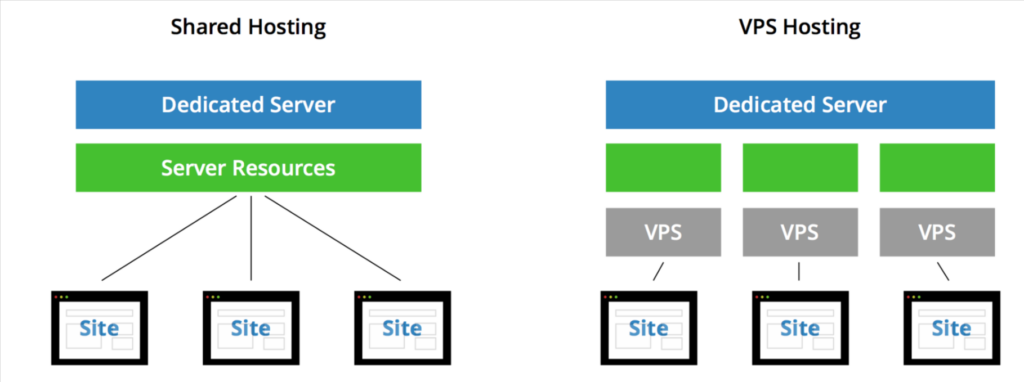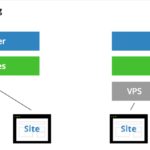Web hosting plays an important role in taking the business online and if you are hosting the website with any web hosting and never meet the option to switch the hosting type. But what if such a situation arrives?
You may face the episode of switching from one hosting type to another if you are aware of its pros for the type of website you want to host.
Whether you’re changing your website or beginning from the start, you’ve to select the web hosting type that has the best chance of making your website the best among all.
When selecting a web hosting type, shared hosting and virtual private server (VPS) hosting are the two most used types.
All you should learn is when is the right type of sharing and when you have to upgrade it.
While both shared and VPS hosting may help any business website to succeed, their working pattern is quite different. So, it’s time to go through the article and understand the shared and VPS hosting.
What is Shared Hosting?
SSD Shared hosting provider in USA Hostripples is the best seller and most used type of web hosting. It is a nominal way to host the website. In this type of web hosting, shared hosting shares the server space and resources with various types of website owners. Customers get enough bandwidth, administrative flexibility, and performance with a shared server, but your web hosting provider manages all technical settings, maintenance, and security.
What is VPS Hosting?
VPS hosting works fully on virtualization. It is a way to use shared servers with more freedom to create and fewer limitations. VPS hosting creates free room to call the server your own and allows you to host your website or application on a dedicated virtual server.
SSD VPS hosting provider in the USA shares the physical server with fewer users but allocates dedicated resources to each user. You aren’t competing for processing power; you don’t have to think about other websites using bandwidth or storage and slowing down your website. SSD VPS hosting provider in USA Hostripples plans are costly than shared hosting, although they are still available at a cheap rate, establishing the main difference between VPS and shared hosting.
Shared Hosting Vs VPS Hosting – 10 Key Differences
- Resource Allocation:
- Shared Hosting: In this type of hosting, you share the server resources like CPU, RAM, and disk space with other website owners.
- VPS Hosting: You get your dedicated resources offering better performance and reliability.
- Control and Customization:
- Shared Hosting: In shared hosting, you are given a limited server configuration.
- VPS Hosting: In VPS hosting, you are authorized to control the full server environment helping to customize it as per your specific needs.
- Performance:
- Shared Hosting: Website performance and working may be affected by other websites on the server mainly in peak hours.
- VPS Hosting: VPS hosting allocates dedicated resources for better performance and faster loading times.
- Security:
- Shared Hosting: Shared hosting is quite risky due to sharing resources with other websites.
- VPS Hosting: VPS hosting gives full control over security measures that decrease the risk of attacks.
- Scalability:
- Shared Hosting: Scaling in shared hosting is quite tough and upgrading to a VPS or Dedicated server is the only option.
- VPS Hosting: VPS hosting allows scaling that allocates more resources to your server as required.
- Cost:
- Shared Hosting: Generally, it is affordable because of shared resources.
- VPS Hosting: VPS is more costly than shared hosting but more cost-effective than dedicated servers.
- Technical Expertise:
- Shared Hosting: To operate shared hosting you need less technical knowledge.
- VPS Hosting: VPS hosting requires technical expertise to manage the server.
- Support:
- Shared Hosting: Shared hosting user includes basic support from web hosting providers.
- VPS Hosting: In VPS hosting support service may be limited and requires more self-reliance or additional support services.
- Uptime:
- Shared Hosting: Various users operate the website on the same shared server, which decreases uptime and affects performance.
- VPS Hosting: Uptime is managed properly in VPS hosting due to dedicated resources and control over the server environment.
- Suitable for:
- Shared Hosting: Anyone who has started a small website with low traffic and limited resources can start with shared hosting.
- VPS Hosting: VPS is the best option for medium-sized websites with higher traffic and resource needs and websites requiring more control and customization.
Sooner or later, the choice is yours and based on your needs and budget. No matter, what is your business type or level, your beginner or expert just moves on with any type of web hosting service as per your needs.






